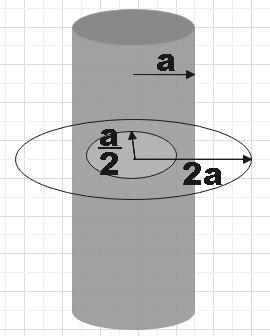Question
Question: A long straight wire of radius a carries a steady current I. The current is uniformly distributed ov...
A long straight wire of radius a carries a steady current I. The current is uniformly distributed over its cross section. The ratio of the magnetic fields B and B’, at radial distances 2a and 2a respectively, from the axis of the wire is:
A. 41
B.21
C. 1
D. 4
Solution
As a first step, you could make a rough diagram to understand the given situation. Then you could recall the standard expressions for both the given cases, that is, for the magnetic fields inside and outside respectively. You could then accordingly substitute and take the ratio to find the answer.
Formula used:
Magnetic field:
Inside the wire,
B=2πR2μ0Ir
Outside,
B′=2πrμ0I
Complete Step by step solution:
In the question, we are given a long straight wire of radius a carrying the current I. we are also said that the current is uniformly distributed over the entire cross section. We are asked to find the ratio magnetic field at radial distances 2a and 2a.
Let B be the magnetic field at radial distance 2a which would be inside the wire and B’ be the magnetic field at radial distance 2a which would be outside of the wire.

We know that magnetic field at a distance r⟨R from the centre of a wire of radius R is given by,
B=2πR2μ0Ir
Substituting the given values, we get,
B=2πa2μ0I(2a)
∴B=4πaμ0I ………………………………………………….. (1)
Now for the second part let us recall the expression for magnetic field at distance r⟩R outside the wire of radius R will be,
B′=2πrμ0I
Substituting the given values,
B′=2π(2a)μ0I=4πaμ0I……………………………………………………. (2)
Now, we could take the ratio of (1) and (2) to get,
B′B=(4πaμ0I)(4πaμ0I)=1
Therefore, we found the ratio of magnetic fields at the given distances to be 1.
Hence, option C is found to be the correct answer.
Note:
You may have noticed that we have substituted the values in the respective standard equations for each case. You could easily derive them by using Ampere’s circuital law if you wish. Though by hearting formulae shouldn’t be promoted, if you could remember them, then it would save you time in competitive exams.
